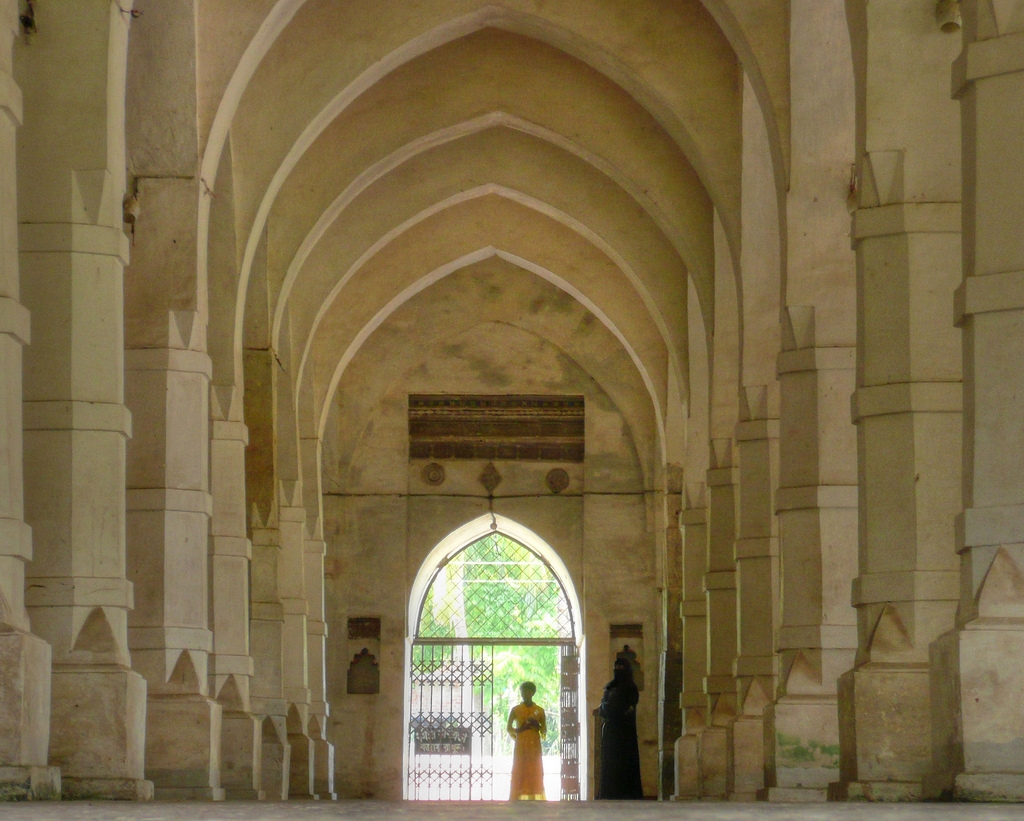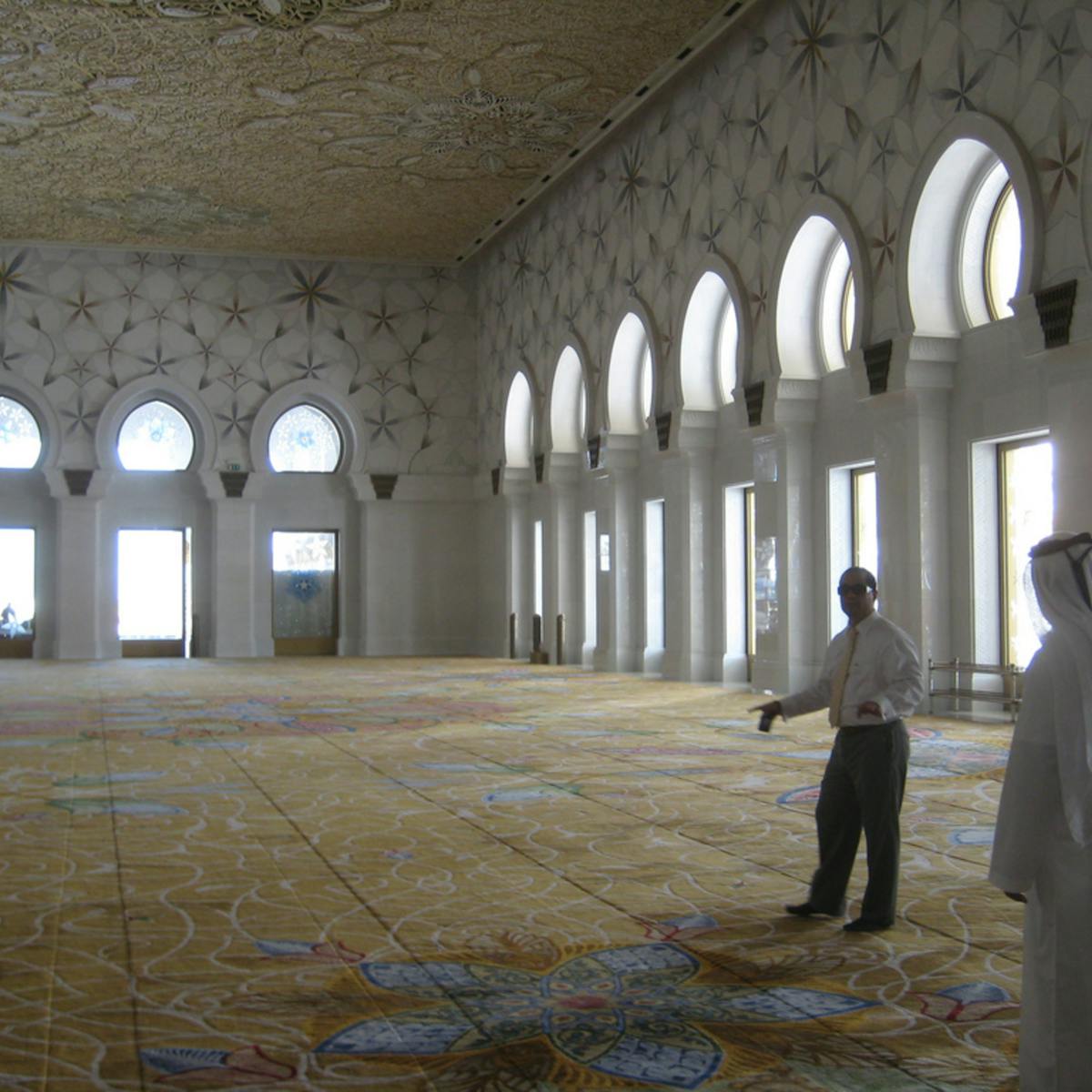As she approached puberty, Salma El-Wardany found that the mosque she previously ran through freely began to shrink around her. She tells a shocking story of the physical response to space being reclaimed.
The female fight to reclaim our space in the mosque
Words by Salma El-Wardanyaverage reading time 5 minutes
- Article
In a world that has been historically built by men, through both their physical and their invested power structures, women must stand up and fight for territory, constantly battling for an inch here or a metre there, if you’re lucky. Just like any other war, we are fighting for land and borders, but in the battle of the sexes, it looks more like property and rooms as opposed to countries and continents.
Perhaps I was a privileged child, or maybe I was just lucky, but it wasn’t until my teenage years struck that I really understood the value of space and how fundamental this fight was.
As a young child I ran happily through my local mosque and community to play. I still cannot remember the exact moment it happened. But as the first signs of puberty began to blossom, I was suddenly denied access, and I felt a distinct sense of loss and that, somehow, my world had become smaller.
All of a sudden, I was restricted. The very buildings I had previously run through were now shrinking around me, confining me to reduced spaces.
Becoming part of those spaces and joining the ranks of women also came with a set of behaviours I was instantly expected to adhere to. I was changed, had been changed, by the spaces I now existed in.
MORE: Daisy Johnson on vaginismus and inept doctors
I believe female-only spaces are incredibly empowering, and in them lies a certain freedom that arrives only when women are together and free of male company and opinions. But when those female spaces exist because male spaces have expanded and excluded women, pushing them into corners, they become a different beast altogether.
They become tentative spaces, the occupants unsure of their right to exist in them. And when you are uncertain of your welcome, your behaviour begins to change.
A restricted view of prayer
The women of my local mosque seemed to shrink with the building; the smaller the room, the quieter they became, unquestioningly accepting their confines and, with them, the idea prevailing that they didn’t have as much right to be there. In contrast, the entitlement of their male peers only grew as the rooms around them expanded.
However, one evening, as the first lyrical notes of the sunset prayer began to fill the mosque, my mother, already a convert who had fought to be part of the Muslim community, did the unthinkable. She marched into the men’s area, a line of women behind her. They took their place behind the men and joined the congregation in worship.
A change of committee members some weeks previously had sparked an internal row in the mosque. Newly arrived members to our community decided that the balcony area that women had previously occupied needed to be blocked off and hidden from view.
The result? We could no longer see the men praying below us, and they could no longer look up to see us. We were utterly cordoned off and hidden from sight.
There is a religious ruling that should anyone wish to join the congregation in prayer, they must be able to view the leader of the prayer or the lines of people who stand behind in a continuous sequence. If they cannot, they’re not part of the congregation.
In defiance of the restriction of the women’s view, my mother led her quiet rebellion that evening. The aim was to pray behind the men and return to the women’s area once prayers had concluded. But, in doing so, my mother placed women and young girls in spaces they hadn’t previously been in. She sent a shockwave through our community.
As the prayer finished, one of the men lost his temper. He took off all his clothes and exposed himself to the shocked women before him, angrily shouting that if they wanted to be with the men, they could really see what a man was made of.

A woman and her daughter stand next to a small women's waiting room near the entrance of the Shait Gumbad Mosque.
Giving yourself permission to exist in spaces
It’s hard not to laugh at the humorous absurdity of the situation as I look back on it now. But it taught me a very grave lesson: men will go to great lengths when they feel their exclusive spaces have been invaded, and that, as a woman, if you step into spaces that are not for you, you will be punished with male sexuality. It will be your fault because you shouldn’t have been there in the first place. It is the same argument used against women walking alone late at night who have fallen victim to sexual abuse, justifying the abhorrent consequences on females for stepping out of the spaces that have been defined for them.
The buildings we sit in and the roofs we worship under can change our relationship with our own faith, ourselves, and even our own bodies.
The segregation of women in mosques keeps them unknown, ‘othered’, as caricatures of gross sexual exaggeration. In our hidden state, the opportunity to find parity and understanding is lost.
While the exclusion of women from spaces changes the way we are perceived, it also changes our relationship with ourselves and how we conduct ourselves in the world.
The women I was surrounded by in my local mosque had firmly inhabited their silence. Experiences shape the permission we give ourselves to exist in spaces.
Years later, as I fought for spaces in boardrooms, battled my way into meetings and calmly asserted my right to roles, salaries and clubs that were previously denied to me, I think back and remember watching my mother physically redefine the spaces we prayed in, taking down a curtain or pushing the barriers a little further out, always making more room, redefining my own world and my perception of what was possible. It taught me that the walls can come tumbling down after all.
About the author
Salma El-Wardany
Half-Egyptian, half-Irish writer Salma El-Wardany is crazy, mad, passionate about the female experience and how feminine identities are constructed and played out in today's world. You can find her drinking tea, eating copious amounts of cake and dressing down the patriarchy at every available opportunity.

